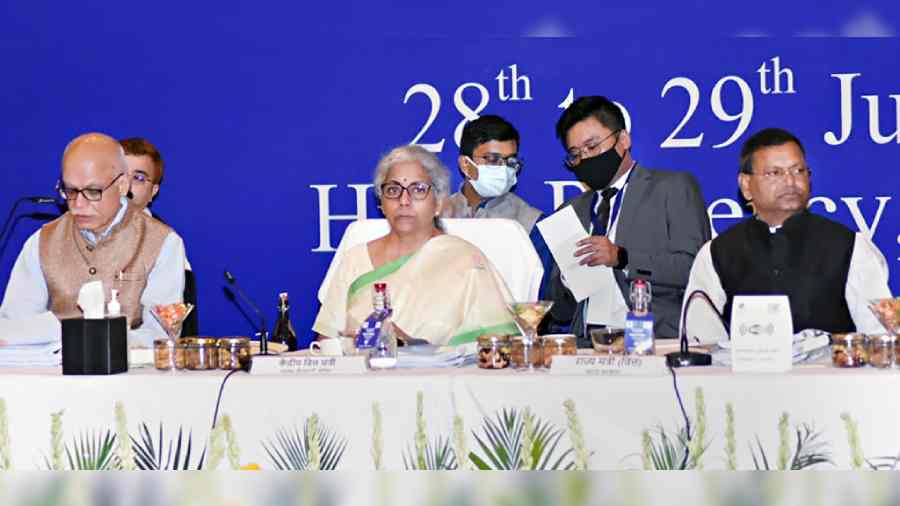The GST Council on Tuesday approved changes in the tax rates on some goods and services with a view to rationalising the levy even as non-BJP ruled states set the stage for a possible confrontation with the Centre over the issue of a larger share in tax revenues.
On the first day of the two-day meeting of the panel headed by finance minister Nirmala Sitharaman and comprising representatives of all states and UTs, a host of procedural compliance-related issues for GST-registered businesses were discussed, officials said.
It also accepted most of the recommendations of a group of ministers which suggested the withdrawal of GST exemption on some services among others.
The discussion on the crucial issues of extension of compensation to states beyond June 2022 and the imposition of 28 per cent GST on casinos, online gaming and horse racing, will take place on Wednesday.
In the meeting on Tuesday, the Council accepted the interim report of the group of state finance ministers, headed by Karnataka chief minister Basavaraj S. Bommai, on rate rationalisation, including correction of inverted duty structure and removing tax exemption on some items.
The GoM had suggested withdrawal of exemption on a host of services including on hotel accommodation of less than Rs 1,000 per day and replacing it with a 12 per cent tax.
It also recommended a levy of 5 per cent GST on room rent (excluding ICU) charged for hospitalised patients where the hospital room charges are above Rs 5,000 per day.
All post office services other than postcards and inland letters, book post and envelopes weighing less than 10 gm should be taxed. Cheques, loose or in book form, should be taxed at 18 per cent.
Exemption given to renting of residential dwellings by businesses for residential use should go, the ministers’ panel has recommended.
With regard to e-way bill on intra-state movement of gold, jewellery and precious stones to check evasion, the Council recommended that states can decide on the threshold above which the electronic bill is to be made mandatory.
A panel of state ministers had recommended the threshold to be Rs 2 lakh and above.
With regard to high-risk taxpayers, a report of a panel of state finance ministers had suggested verification after registration for high-risk taxpayers under GST, besides using verification of electricity bill details and bank accounts for identifying such taxpayers.
The ministerial report included recommendations on the correction of the inverted duty structure.
It recommended that the refund of input tax credit (ITC) on account of inverted rates be disallowed for edible oils. The inverted duty correction is likely on printing, writing/ drawing ink from 12 per cent to 18 per cent.











